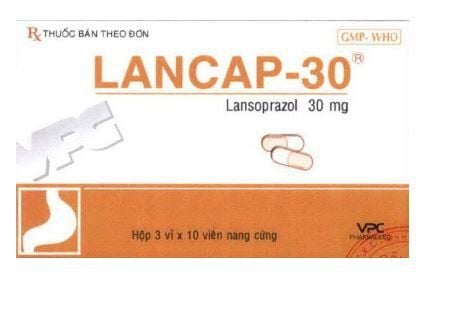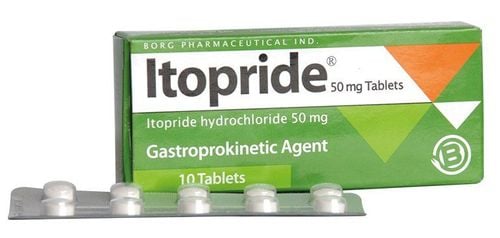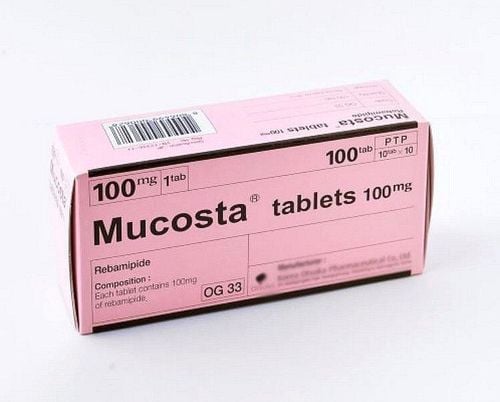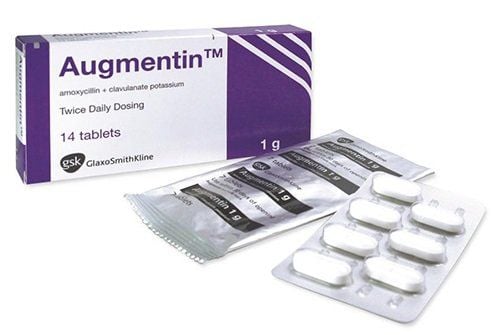Reprat 40mg is a medication from Germany formulated with Pantoprazole and other ingredients, belonging to a group of drugs used to treat gastrointestinal disorders, particularly gastric conditions such as gastric and duodenal ulcers, and gastroesophageal reflux disease
1. What is Reprat?
Reprat 40mg has a registration number in Vietnam of VN-18128-14, registered by Aegis Ltd – Cyprus. The medication is used to treat gastroesophageal reflux disease, gastric and duodenal ulcers (including gastric ulcers caused by Helicobacter pylori), Zollinger-Ellison syndrome, and other acid secretion disorders due to various conditions.
Reprat is produced in the form of enteric-coated tablets. Each box contains 2 blister packs, with each pack containing 10 tablets. The main ingredient of Reprat 40mg is Pantoprazole in the form of Pantoprazole sodium sesquihydrate. Each Reprat 40mg tablet contains:
The active ingredient Pantoprazole at a dosage of 40mg. This is a Benzimidazole derivative that selectively proton-pump inhibitors, thereby reducing gastric acid secretion.
Other excipients in each tablet include: Crospovidone, Sodium carmellose, Maltitol, Calcium stearate, Lecithin, Yellow iron oxide, Opadry II yellow 85G52042 (Polyvinyl Alcohol), Talc powder, Macrogol 3350, Titanium dioxide, Ethyl acrylate copolymer, Triethyl citrate, Anhydrous sodium carbonate, Methacrylic acid to make one tablet.
2. What are Reprat 40mg used for?
Indications for Reprat 40mg:
For adults and children aged 12 years and older: Reprat 40mg is indicated for the treatment of gastroesophageal reflux disease.
For patients with gastric and duodenal ulcers: Reprat 40mg is often prescribed alone or in combination with appropriate antibiotic therapies to treat gastric and duodenal ulcers.
Additionally, Reprat is indicated for patients with Zollinger-Ellison syndrome. It is combined with non-steroidal anti-inflammatory drugs (NSAIDs) to prevent the risk of gastric and duodenal ulcers. For patients infected with Helicobacter pylori (HP), pantoprazole is combined with antibiotics including Amoxicillin, Metronidazole, and Clarithromycin to enhance treatment efficacy.
3. Dosage and Administration of Reprat 40mg
Reprat 40mg is formulated as an enteric-coated tablet, so it should be taken orally. Take the medication with a glass of plain water or cooled boiled water.
It is recommended to swallow the tablet whole, without chewing or crushing it, to avoid affecting its bioavailability and efficacy. The medication should be taken daily in the morning, and it can be taken either before or after breakfast. It is advised to take Reprat 1 hour before a meal.
Follow your doctor’s instructions.
Dosage for Reprat 40mg:
For gastroesophageal reflux disease in individuals over 12 years old:
- 1 tablet once a day.
- If necessary, the dose may be doubled to 2 tablets per day.
- Each treatment course typically lasts for 8 weeks. If inflammation or ulcers persist after 8 weeks, an additional continuous course of 8 weeks is recommended.
Dosage for patients with gastric and duodenal ulcers in adults:
For gastric and duodenal ulcers in adults:
For HP-infected patients: It may be combined with antibiotics to eliminate the bacteria according to one of the three regimens:
- 1 Reprat 40mg tablet + 1000mg Amoxicillin + 500mg Clarithromycin, twice a day.
- 1 Reprat 40mg tablet + (400-500mg) Metronidazole + (250-500mg) Clarithromycin, twice a day.
- 1 Reprat 40mg tablet + 1000mg Amoxicillin + (400-500mg) Metronidazole, twice a day.
It is advisable to take Reprat 40mg 1 hour before dinner and to continue for 1-2 weeks.
For non-HP infection: 1 tablet once a day.
The treatment duration is 2-4 weeks for duodenal ulcers and 4-8 weeks for gastric ulcers.
For Zollinger-Ellison syndrome:
Start with 2 tablets per day or consult your doctor.
4. When is Reprat 40mg contraindicated?
Reprat 40mg should not be used in the following cases:
- Individuals with a history of hypersensitivity to Pantoprazole, other Benzimidazole derivatives, or any component of the medication.
- Children under 12 years of age.
Currently, there is insufficient data regarding the efficacy and safety of Reprat in this age group, so it should not be used.
5. Side effects of Reprat 40mg
The potential side effects that may occur when using Reprat 40mg include:
- Sleep disturbances.
- Headache, dizziness.
- Diarrhea, nausea, vomiting, bloating, abdominal distension, constipation, abdominal pain, dry mouth, discomfort.
- Rash, itching.
- Increased liver enzyme levels.
- Hip, wrist, and spinal fractures.
- Weakness, fatigue, malaise.
Most of these side effects are usually mild and transient. However, if these symptoms worsen, it is important to notify a doctor immediately for timely management.
6. What should you do if you miss a dose or overdose of Reprat 40?
In cases of overdose, if the patient exhibits dangerous symptoms, it is important to immediately call the emergency center at 115 or go to the nearest healthcare facility. Family members should provide the doctor with the current prescription and all medications being taken, including both prescription and over-the-counter drugs.
If a dose is missed during treatment, it should be taken as soon as possible (usually within 1-2 hours of the scheduled time). However, if it is too close to the next dose, the missed dose can be skipped, and the next dose should be taken at the scheduled time. Do not double the prescribed dose.
7. Interactions between Reprat and Other Medications
Reprat may interact with the following medications when combined:
- It can reduce the absorption of drugs such as Aspirin, Ketoconazole, Itraconazole, etc.
- It may decrease the efficacy of antiviral medications and HIV treatments.
Therefore, it is important to inform your doctor or pharmacist if you are taking any other medications or dietary supplements to achieve the best treatment outcomes.
For pregnant women: Currently, there are no reports indicating that the use of Reprat 40mg affects pregnant women; however, it is still advisable to avoid using the medication. Consult a doctor if it is necessary to use it.
For breastfeeding women: Some studies have found that when a mother uses Reprat 40mg, it may be excreted into breast milk and transmitted to the infant through breastfeeding. Therefore, it is best to avoid or limit the use of this medication while breastfeeding. Many medications have not been fully studied for their effects during this period, including Reprat 40mg, so mothers should carefully read the usage instructions and consult a doctor or pharmacist before deciding to take the medication.
Store Reprat 40mg in a dry, cool place at room temperature between 15-30 degrees Celsius.
The above information is important regarding Reprat 40mg, and understanding this information will help improve the effectiveness of the treatment process.
To arrange an appointment, please call HOTLINE or make your reservation directly HERE. You may also download the MyVinmec app to schedule appointments faster and manage your reservations more conveniently.













